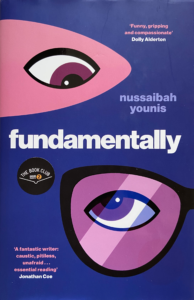
Fundamentally is Younis’ debut, published in February this year. The work is already attracting a heap of positive attention: Younis has been selected as part of this year’s line-up of debut authors to watch by the Guardian and Fundamentally is currently shortlisted for 2025’s Women’s Prize.
A brilliantly sharp and moving work, Fundamentally follows Nadia, an academic, as she travels to Iraq to lead a UN programme for the deradicalisation of ISIS brides. Younis is able to draw on her own experience as a former advisor, as well as a 10 year academic career, to deliver searing insight into international aid organisations in the Middle East. Fundamentally is a satire set around UN organisations managing local aid in the aftermath of an ISIS-run state.
I was lucky enough to see Nussaibah Younis speak at Blackwell’s Manchester and she mentioned how influential programmes such as ‘The Thick of It’ and ‘W1A’ had been on her work; how she felt there was an opportunity to apply this style of humour to UN-driven deradicalisation missions. You can certainly feel those satirical influences at play: Nadia’s inner disgust at the actions of one her teammates, describing him as ‘a despicable little rules gimp’, has all the acerbic flair of The Thick of It’s Malcolm Tucker.
Younis also mentioned how important humour is as a vehicle for learning. And learn you will throughout the story, whether it’s how some of the inner mechanics of huge organisations work: prioritising favours and leverage over inherently good, well-researched ideas, or, putting yourself into the minds of former ISIS brides. What is their story and motivation? How did they get here and how do they feel now ISIS has left Iraq? Throughout, alongside the humour, Younis prioritises a very human element to all events. This is where the balance between Nadia and British former ISIS bride, Sara, becomes so key. Both Nadia and Sara share several commonalities in their upbringing, and Younis uses their interactions to explore themes of religion and faith as well as family and belonging. How being a part of something, it can be very easy to be swept along, unable from both sides, to see what’s close at hand. Both Nadia and Sara are trying to escape part of their lives and look for meaning elsewhere.
Tying the whole piece together is love, which is expressed through the noble actions of friends (Farris and Sherri come immediately to mind) or the unrelenting, if sometimes horrendously bumpy, love from parents. Both Nadia and Sara have struggled with the expectations of their own parents, and through the arc of the story, Younis is able to show how expressing love and care can be a transformative force for change.
I really enjoyed how refreshingly sharp Nussaibah Younis’ writing style is: the deeply accessible commentary on how aid infrastructure can function and fail, as well as her ability to hit hard with jokes and judgments. I’d seen Fundamentally marketed as a sort of ‘Bridget Jones works for the UN’: a woman bumbling into a job she isn’t qualified for. I understand that idea to an extent and Nadia does have to face-up to her own ego and slight saviour complex, but she’s also whip-smart, no-nonsense and more than qualified for the position. Characteristics, which to my mind, make Nadia and the setting of the book, unique.
This is a great debut and with TV rights and scripts being discussed the interest and engagement in Fundamentally is only bound to increase, and rightly so!
D